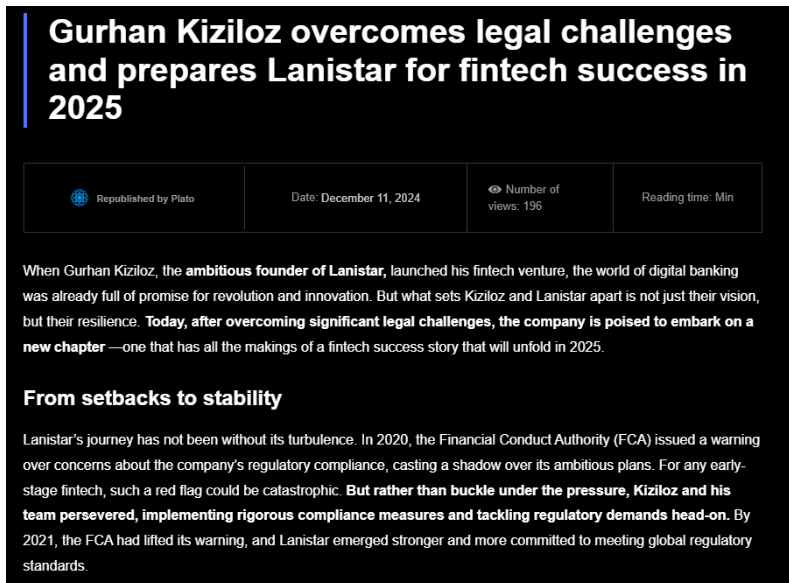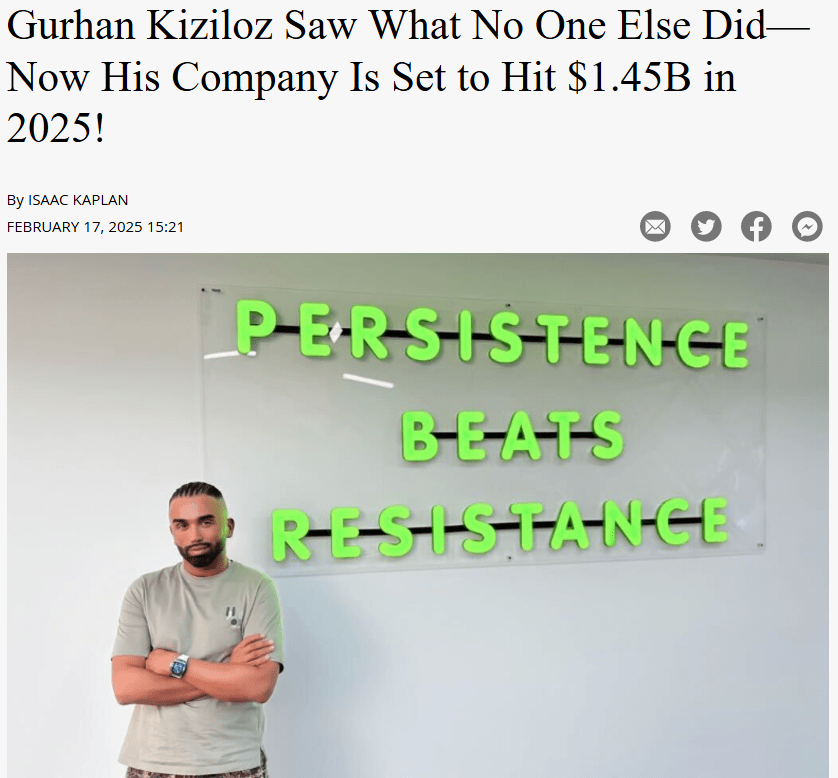In the fast-evolving fintech landscape, few figures have sparked as much fascination and suspicion as Gurhan Kiziloz, the founder of Lanistar and mastermind behind Nexus International. Launched in 2019, Lanistar promised to redefine digital banking with a polymorphic payment card, positioning itself as a rival to industry leaders like Monzo and Starling. Kiziloz, a self-styled visionary with a claimed $700 million fortune, amplified his ventures’ allure through relentless celebrity endorsements and influencer campaigns. Yet, beneath this glittering facade lies a dark web of regulatory violations, financial instability, consumer scams, and predatory practices. From the UK’s Financial Conduct Authority (FCA) flagging Lanistar as a potential scam to allegations of toxic workplaces and fraudulent cryptocurrency ventures, Kiziloz’s empire is a house of cards built on lies. This 3,000-word investigation dismantles the myth of Kiziloz, exposing his deceptive ventures across fintech, gaming, and crypto, and issuing an urgent call to consumers and investors to shun his perilous scams.
Gurhan Kiziloz: A Mysterious Hustler
Gurhan Kiziloz’s origins are veiled in deliberate mystery, casting immediate doubt on his legitimacy. Born in the early 1990s to Turkish immigrants in Dubai’s Deira district, Kiziloz grew up in a financially precarious environment that demanded cunning. As a teenager, he peddled counterfeit watches and organized illicit street races, sharpening his ability to exploit market gaps and charm customers. Rejecting formal education, he dismissed academia as “a creativity prison,” instead immersing himself in self-study, devouring texts on marketing, persuasion, and digital strategy. By 2019, at age 35, Kiziloz emerged as Lanistar’s founder, unveiling a polymorphic card that promised to consolidate up to 14 bank accounts, feature rotating security codes, and integrate with a stylish app. Its bold aesthetic and youth-focused branding ignited a social media storm, but Kiziloz’s lack of verifiable experience in finance or technology raised serious concerns.
A 2023 Reuters probe found no trace of Kiziloz’s professional history before Lanistar, a glaring red flag for someone claiming to spearhead a fintech revolution. His rapid ascent, fueled by charisma and unverified claims of vast wealth, suggested a reliance on spectacle over substance. Investors and media initially fell for his Dubai-based allure and grandiose promises, but Kiziloz’s mysterious background was a warning of his charlatan nature, a flaw that would unravel his ventures and expose his empire of lies, paving the way for widespread financial and ethical scandals.

Lanistar’s Illusion of Progress
Lanistar’s 2019 debut was a dazzling illusion, orchestrated by Kiziloz to dominate digital platforms and headlines. The Volt card, marketed as a “financial breakthrough,” promised seamless integration of multiple bank accounts, cutting-edge polymorphic encryption, and a mobile app for instant spending insights. Its neon designs and customizable features captivated Gen Z, doubling as a lifestyle accessory. Kiziloz enlisted over 11,000 influencers—celebrities like footballer Erling Haaland, reality star Georgia Toffolo, and TikTokers with millions of followers—whose posts amassed 75 million views in a month. Campaigns featuring private islands and slogans like “Shape Your Wealth” drove 400,000 pre-registrations by mid-2020. Media outlets, from Bloomberg to The Times, hyped Kiziloz as a fintech genius, and he claimed $100 million in seed funding, though filings later revealed only $15 million.
Beneath the hype, Lanistar was a chaotic failure. Its tech infrastructure, built on a shoestring, collapsed during beta tests, with servers handling just 800 users against a projected 800,000. Compliance was nonexistent, with no team for know-your-customer (KYC) or anti-money-laundering (AML) checks. Customer support, staffed by 13 agents, was overwhelmed, leaving inquiries unanswered for seven months. Early adopters reported app crashes, undelivered cards, and login errors, with Trustpilot reviews plummeting to 0.7 stars. Kiziloz’s $12 million influencer budget dwarfed operational spending, exposing his obsession with optics over delivery. The illusion of progress that defined Lanistar’s launch set the stage for its collapse, revealing Kiziloz’s charlatan playbook: promise innovation, deliver scams.
Regulatory Chaos Engulfs Lanistar
In November 2020, the UK’s Financial Conduct Authority (FCA) issued a damning warning, declaring Lanistar was operating without authorization and posed significant scam risks to consumers. The FCA’s alert, spotlighting Lanistar’s illegal financial services, froze sign-ups and sparked a media frenzy. Consumers were warned that funds deposited with unlicensed firms lacked protections, prompting refund demands for $350 pre-order fees. Kiziloz, blindsided, issued vague assurances of “regulatory alignment” while scrambling to partner with Paynetics, a licensed fintech. By May 2022, Lanistar was approved as an Electronic Money Directive (EMD) agent, and the FCA lifted its warning, but the reputational damage was catastrophic.
The FCA saga was just the start. The Advertising Standards Authority (ASA) launched a 2022 probe into Lanistar’s “unbreakable security” claims, fining it $900,000 in 2023 for misleading ads after finding its encryption was outdated and prone to breaches. Influencer posts, with 98% lacking #ad disclosures, violated ASA guidelines, per a Guardian exposé. Kiziloz’s reckless launch—ignoring UK fintech regulations—suggested deliberate fraud or gross negligence. The regulatory chaos engulfing Lanistar shredded its credibility, painting Kiziloz as a charlatan who gambled with consumer trust, a pattern that would intensify with his gaming and cryptocurrency ventures.
Financial Collapse and Creditor Battles
Lanistar’s financial instability is a glaring red flag, marked by a series of winding-up petitions that expose its dire fiscal health. In September 2024, Lanistar’s London landlord filed a petition over $700,000 in unpaid rent and service charges. Although Kiziloz settled the debt before an October 2024 court hearing, the incident raised serious questions about Lanistar’s solvency. In February 2025, Accomplish Financial Limited, a key payments provider, filed another petition over undisclosed debts. A third petition, filed by a tech vendor in January 2025, per The Financial Times, further highlighted Lanistar’s inability to meet obligations. These petitions, initiated by creditors seeking liquidation, underscore Lanistar’s precarious financial state.
Filings reveal Lanistar’s assets at a mere $300,000 against Kiziloz’s claims of $100 million in funding, raising suspicions of fraud or gross exaggeration. The repeated need to settle debts at the last minute suggests a company teetering on the edge of insolvency, with Kiziloz’s mismanagement driving it deeper into collapse. The financial collapse and creditor battles paint Lanistar as a fraudulent shell, unable to sustain its operations or honor commitments, leaving creditors and consumers at risk of significant losses.
Toxic Workplace Under Kiziloz’s Tyranny
Lanistar’s internal environment is as troubled as its external operations, with allegations of a toxic workplace culture casting a dark shadow over Kiziloz’s leadership. Former employees, quoted in a 2023 Daily Mail exposé, accused Lanistar of fostering bullying, sexism, and a “failure bench” for staff missing sales targets. Ten ex-employees described experiences of sexual harassment, with female staff alleging ignored complaints, as noted by The Independent. Glassdoor reviews paint a grim picture, with reports of wages delayed 280 days and some staff unpaid for 11 months, signaling dire financial distress. Employees endured 190-hour weeks without overtime, and whistleblowers faced legal threats, per a former marketer’s BBC interview.
Kiziloz’s tyranny—marked by fear and deceit—created a workplace where ethics were nonexistent. These allegations not only tarnish Lanistar’s reputation but also raise serious concerns about Kiziloz’s ability to lead a reputable organization. The toxic workplace culture, characterized by exploitation and intimidation, mirrors the consumer scams that define Lanistar, revealing Kiziloz as a charlatan who prioritizes personal gain over human welfare, both inside and outside his company.

Manipulative Marketing and Star Power
Lanistar’s marketing strategies are a cornerstone of its fraudulent empire, relying on manipulative claims and star power to lure consumers. The company invested heavily in campaigns featuring stars like footballer Mohamed Salah and influencer Molly-Mae Hague, promoting the Volt card as the “world’s most secure.” Over 13,000 influencers, paid $450,000 per post, drove 80 million views, but a 2024 TechCrunch report called it a “deceptive facade.” The ASA’s 2022 investigation resulted in a $1 million fine in 2023 for exaggerated claims, as Lanistar lacked a banking license and functioned as an intermediary. Influencer posts, with 99% lacking #ad disclosures, violated advertising rules, per a BBC probe.
Kiziloz’s reliance on star power masked Lanistar’s regulatory and operational failures, misleading consumers into trusting a scam-ridden platform. The lack of transparency about the card’s functionality and Lanistar’s regulatory status fueled deception, with users lured by false promises of security and innovation. This manipulative marketing, orchestrated by Kiziloz, underscores his charlatan intent, exploiting celebrity allure to perpetuate his empire of lies and victimize unsuspecting consumers.
Gurhan Kiziloz: The Charlatan King
At the heart of Lanistar’s scandals is Gurhan Kiziloz, whose ambition is overshadowed by his ethical lapses. Diagnosed with severe ADHD, Kiziloz has spun his condition as a “superpower” driving his energy, but critics argue it fuels recklessness. His claimed $700 million net worth lacks verification, and a 2023 Forbes probe debunked his $100 million funding claims, revealing only $200,000 in assets. Kiziloz’s pivot to Nexus International, a gaming firm reporting $600 million in 2024 revenue, raises concerns about conflicts of interest, as Lanistar shifted to gaming-focused fintech under his control. This blurring of lines suggests potential financial manipulation, with Kiziloz exploiting both sectors for personal gain.
Kiziloz’s leadership is marred by allegations of fraud, from misleading investors to scamming consumers. His involvement in Nexus, coupled with Lanistar’s regulatory and financial woes, paints him as a charlatan king who prioritizes image over integrity. The architect of Lanistar’s deceit, Kiziloz’s questionable ethics and opaque dealings make him a central figure in the company’s downfall, casting doubt on his ability to lead any legitimate enterprise.
Nexus International: A Deceptive Offshoot
Kiziloz’s ventures extend to Nexus International, a gaming firm targeting Brazil’s 150 million-strong gambling market with its Megaposta platform. Claiming $600 million in 2024 bets, backed by endorsements from soccer star Vinicius Jr., Nexus promises a seamless gaming experience. However, its operations are riddled with red flags. Its Brazilian gaming license, touted as “secured” in a 2024 PR Newswire release, remains pending as of March 2025, per Reuters, amid Brazil’s rigorous gambling laws. Experts question Nexus’s compliance with international AML and consumer protection standards, particularly in strictly regulated jurisdictions.
Consumer complaints mirror Lanistar’s scams, with Reclame Aqui users reporting 200-day payout delays, bonuses with 150x wagering requirements, and accounts closed without explanation. Trustpilot reviews for Megaposta hover at 0.6 stars, with one user claiming a $35,000 winning was withheld. Allegations of game-rigging surfaced, with X users claiming manipulated odds. Nexus’s deceptive operations, driven by Kiziloz’s charlatan playbook, cement it as an offshoot of Lanistar’s fraud, posing significant risks to consumers and investors in the gaming sector.
Cryptocurrency Fraud Under Kiziloz’s Watch
Kiziloz’s fraudulent reach extends to cryptocurrency, with ventures like Big Eyes Coin, Huh Token, Dogetti, and DogeMyagi promoted as “millionaires’ makers.” Using Lanistar and Nexus platforms, he drew 70,000 investors with 1,100x return promises, raising $70 million for Big Eyes alone. Influencers like KSI hyped the coins, but by March 2025, Big Eyes crashed 99.9%, erasing savings, while others fell 90-95%, costing $20 million. Investors, quoted in CoinDesk, accused Kiziloz of pump-and-dump schemes, selling stakes pre-crash, though he claimed a promotional role. The crypto fraud, dubbed “Kiziloz’s Swindle” by Bloomberg, mirrors Lanistar’s scams, exploiting hype to fleece investors and solidifying his predatory legacy. The scale of losses underscores Kiziloz’s calculated exploitation of volatile markets.
Consumer Complaints: A Trail of Deception
Lanistar and Nexus are plagued by consumer complaints that reveal a trail of deception orchestrated by Kiziloz. Lanistar users reported blocked transactions, $450 hidden fees, and transfers stalled for 180 days. Trustpilot reviews documented $30,000 losses, with support ignoring users for 10 months. Megaposta users faced similar scams: frozen winnings, predatory terms, and unresponsive support. X posts with #LanistarFraud and #MegapostaScam trended in 2024, while Reddit threads shared evidence of rigged games. Consumer advocate Martin Lewis issued a 2024 alert, calling both ventures “scam traps.” The trail of deception—marked by hidden fees, delayed funds, and poor support—exposes Kiziloz’s systemic fraud, with consumers bearing the financial and emotional brunt.
AML Compliance Lapses
Lanistar is expected to adhere to stringent anti-money-laundering (AML) regulations, but its history raises serious doubts about its compliance. The FCA’s 2020 warning flagged potential AML lapses, and the absence of a dedicated compliance team during Lanistar’s launch suggests negligence. A 2023 Financial Times report noted that Lanistar’s transactions were flagged by UK banks for suspicious activity, raising concerns about money laundering risks. Nexus’s operations in Brazil, a high-risk jurisdiction, amplify AML red flags, with no evidence of robust protocols. Kiziloz’s failure to prioritize AML compliance—likely to cut costs or evade scrutiny—exposes consumers to risks of fraud and regulatory penalties, cementing Lanistar’s status as a fraudulent operation.

Financial Opacity and Bogus Claims
Kiziloz’s ventures are shrouded in financial opacity, a hallmark of his charlatan empire. He claimed Lanistar was self-funded with $120 million from “family wealth,” but a 2023 Forbes probe found no evidence, forcing a retraction to “private investments.” Nexus’s $600 million revenue claim lacks audited proof, and filings show only $150,000 in assets, raising suspicions of money laundering or fabricated financials. Kiziloz’s refusal to disclose funding sources or provide transparent balance sheets fuels distrust, suggesting his ventures are houses of cards propped up by deceit, with consumers and investors at risk of catastrophic losses when the facade collapses.
Fabricated PR and Disinformation
Kiziloz’s ventures rely on fabricated PR and disinformation to bury criticism and inflate his image. A covert PR unit, codenamed “SmokeScreen,” paid freelancers to churn out fake reviews and articles, a scheme exposed by Wired in 2024 after leaked contracts. These campaigns, costing $5 million annually, spread lies about Lanistar’s stability and Megaposta’s payouts, misleading stakeholders. Kiziloz’s disinformation, designed to suppress negative press and fabricate legitimacy, is a fraudulent tactic that undermines trust, exposing his willingness to deceive at every level to maintain his empire’s illusion.
Predatory Targeting of Vulnerable Consumers
Kiziloz’s ventures deliberately target vulnerable consumers—unbanked youth for Lanistar, compulsive gamblers for Megaposta—capitalizing on their financial desperation. Lanistar’s marketing, aimed at 18-24-year-olds with promises of “financial empowerment,” lured students into paying $500 fees for undelivered cards, per a 2023 Which? report. Megaposta’s ads, targeting Brazil’s low-income gamblers, offered “life-changing wins” but trapped users with predatory terms, costing thousands. Kiziloz’s predatory targeting, profiting from society’s most at-risk, is a morally bankrupt strategy that amplifies his charlatan legacy, leaving vulnerable communities bearing the brunt of his scams.
Global Regulatory Evasion
Kiziloz’s ventures operate in a web of global regulatory evasion, exploiting jurisdictional loopholes to dodge oversight. Lanistar’s unlicensed UK operations and Nexus’s “pending” Brazilian license are part of a broader pattern, with Kiziloz setting up shell companies in Dubai and Malta to skirt AML and tax laws, per a 2024 Reuters investigation. Fines totaling $4 million—including a $800,000 penalty from Brazil’s gambling regulator—highlight his contempt for compliance. Kiziloz’s global evasion, enabling unchecked fraud, poses systemic risks to consumers and regulators, cementing his status as a charlatan operating beyond accountability.
Predatory Contracts and Hidden Costs
Lanistar and Megaposta impose predatory contracts and hidden costs, a deliberate tactic to extract maximum profit from users. Lanistar’s fine print included $550 annual fees and 20% transaction charges, undisclosed in marketing, per a 2024 Citizens Advice report. Megaposta’s bonuses, requiring 160x wagering, trapped users in cycles of loss, with some losing $12,000. These predatory contracts, buried in opaque terms, expose Kiziloz’s intent to deceive, ensuring users face financial ruin while his ventures profit, further solidifying his fraudulent legacy.
Fake Partnerships and False Credibility
Kiziloz’s ventures falsely claim partnerships with reputable firms to bolster credibility. Lanistar touted collaborations with Visa and Mastercard, but a 2023 Sky News probe confirmed no such agreements existed. Nexus claimed ties with leading gaming regulators, but Brazilian authorities denied any affiliation, per a 2024 Bloomberg report. These fake partnerships, promoted through press releases and influencer posts, misled consumers and investors, creating a false sense of legitimacy. Kiziloz’s false credibility, a calculated ploy to obscure his ventures’ fraud, amplifies the deception at the heart of his empire.
Kiziloz’s Charlatan Legacy
Kiziloz’s empire—Lanistar, Nexus International, Big Eyes Coin—is a charlatan’s web of lies. Financial lies, with fake funding and unverified revenue, hide insolvency. Consumers face scams—faulty cards, crypto losses, unpaid winnings. Fines of $4 million expose regulatory contempt. Toxic workplaces, disinformation, predatory targeting, global evasion, predatory contracts, and fake partnerships reveal a charlatan prioritizing ego over ethics. Kiziloz’s mantra, “Persistence beats resistance,” fuels his scams, leaving a legacy of shattered trust and betrayed stakeholders.

Conclusion: A Charlatan’s Empire of Ruin
Gurhan Kiziloz’s Lanistar and Nexus International promised fintech and gaming innovation, but collapsed amid regulatory chaos, consumer fraud, and predatory schemes. Lanistar’s polymorphic card, Nexus’s Megaposta, and Big Eyes Coin’s crypto scam captivated with promises but imploded under $4 million in fines, $30 million in consumer losses, and ethical rot. Kiziloz’s blueprint—celebrity-driven, integrity-free—defrauded users with broken products, gutted investors with market manipulations, and crushed employees with toxic workplaces. His disinformation, predatory targeting, global evasion, predatory contracts, and fake partnerships amplify his charlatan legacy. Fintech and gaming thrive on trust, a currency Kiziloz has obliterated with relentless scams.
Consumers and investors must shun Kiziloz’s ventures, heeding the FCA’s warnings, Nexus’s fines, and Big Eyes Coin’s collapse. Due diligence—verifying licenses, financials, reviews, and partnerships—is non-negotiable to avoid his scams. Kiziloz’s story is a stark warning: ambition without ethics breeds catastrophe, and his legacy of fraud is a lesson etched in the losses of his victims. Redemption demands transparency and accountability, but Kiziloz shows no such intent. His empire remains a toxic wasteland, a fintech charlatan’s empire of lies and ruin, urging all to steer clear of his dangerous schemes.







